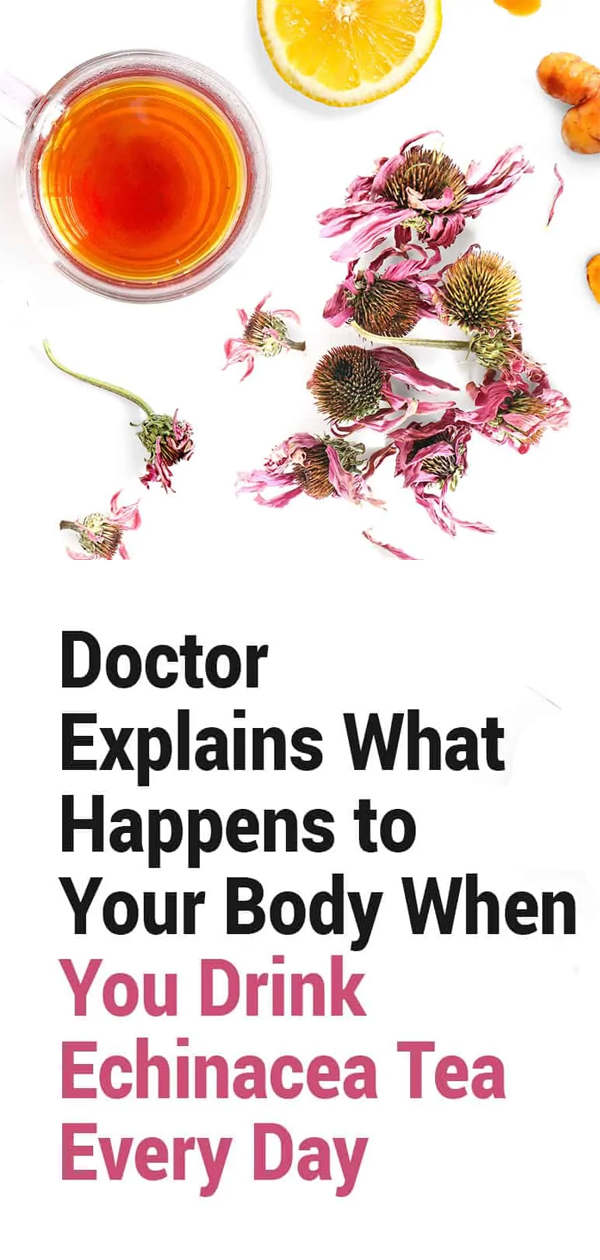Many people know Echinacea tea as a remedy to help fight off a cold. What they don’t realize is that the supplement provides multiple health benefits. Native to North America and Europe, Echinacea is not a single plant. Instead, it is a group of flowering plants that belong to the daisy family, all of which grow in wooded areas and prairies.
The three species of Echinacea used for medicinal purposes include purpurea, Angustifolia, and pallida. All three species contain compounds that effectively fight off illnesses and contribute to better overall health. Some of these compounds include caffeic acid, alkamides, phenolic acids, rosmarinic acid, and polyacetylenes. For these reasons, Echinacea is of a favorite go-to herbal supplement for countless people all around the world.
Everything You Need To Know About Echinacea-Infused Tea
Now we’ve explained why so many people rely on Echinacea for wellness. So let’s take a moment to explore how herbalists make a delicious, health-boosting tea.
In most cases, those who make Echinacea-infused tea will use the purpurea species of the flowering plant. To make the tea, they cut up the roots and leaves of the plant before adding all of the pieces to their tea.
To further enhance its flavor, many will also add mint or lemongrass to their tea.
Lastly, Echinacea-infused tea is caffeine-free. That fact means that those who are caffeine-sensitive can enjoy it without having to worry about feeling jittery afterward. Also, these teas to do not contain any calories, according to Nutritionix, the world’s largest and most accurate nutrition directory.
What Happens To Your Body When You Drink Echinacea-Infused Tea Every Day?
Echinacea tea does more than treating your taste buds and keeping you hydrated. In fact, here are a few more ways you might benefit from drinking Echinacea tea every day.
1 – May Help Reduce Inflammation
For those who may be struggling with painful inflammation, drinking Echinacea-infused tea every day may provide some much-needed relief. Of course, the argument can be made that inflammation is the body’s way of healing itself; however, ongoing chronic inflammation can cause serious health problems, including certain cancers, rheumatoid arthritis, atherosclerosis, and periodontitis.
In a 30-day study published by Healthline, the compounds in Echinacea were shown to reduce inflammation, pain significantly, and swelling in study participants with osteoarthritis.
Also worth mentioning, these same study participants responded better to the Echinacea-based compounds than they did to over-the-counter pain relievers. The OTCs studied included ibuprofen and acetaminophen.
Lastly, in a separate study conducted on mice, these same compounds were also effective in reducing acute phase reactants and memory-loss stemming from inflammation.
2 – Healthier Skin
The same anti-inflammatory properties in Echinacea-based teas and even the stand-alone variants of this herbal supplement have been shown to inhibit the growth of propionibacterium, a form of bacteria that causes acne. And the healthy skin benefits do not end there as several studies have revealed that these same anti-inflammatory properties can help keep the skin hydrated, which, in turn, reduces the appearance of fine lines and wrinkles. Lastly, these same anti-inflammatory properties have been shown to improve symptoms of eczema, a skin condition characterized by inflamed, itchy, red, cracked, and rough patches of skin.
3 – May Reduce Feelings Of Anxiety
Drinking Echinacea-infused tea every day or consuming capsules that contain the herbal supplement may help ease anxiety.
In a relatively recent study conducted on mice that ingested specific Echinacea-based compounds, namely alkamides, rosmarinic acid, and caffeic acid, 3 out of 5 were noticeably less anxious by the end of the study.
Similar results were also revealed in human study participants as well. However, researchers and scientists involved in these studies caution that they must conduct more tests to confirm safety, efficacy, and long-term benefits.
4 – May Lower The Risk Of Developing Certain Cancers
Taking Echinacea supplements or drinking Echinacea-infused tea can potentially lower your risk of developing certain cancers. To further substantiate this claim, several test-tube studies prove that Echinacea-based extracts suppressed the growth of abnormal cells and also triggering cell death when it comes to pancreatic and colon cancer.
Although the underlying mechanism resulting from these positive effects are unclear, researchers and scientist involved in these test-tube studies theorize that the effects are likely the result of the immune-boosting properties that are present in the powerful herb.
It is important to note that these same researchers and scientists caution that Echinacea-based compounds can negatively interact with chemotherapy and other traditional cancer-fighting treatments. So those who consider drinking Echinacea tea as to combat cancer should speak with their physician before doing so.
5 – MAY HELP LOWER HIGH BLOOD GLUCOSE LEVELS
For those who are struggling with diabetes, it should come as no surprise that keeping your blood glucose levels under control can go a long way toward reducing your chances of developing diabetic complications, some of which include
- Kidney damage
- Vision problems
- Nerve damage
- Hearing loss
- Alzheimer’s disease
- Foot problems
Similar to protecting against certain cancers, several test-tube studies revealed that drinking Echinacea-infused tea every day may help stabilize and even lower high blood glucose levels. And according to a separate study published by the National Institute of Health, purpurea, 1 of 3 Echinacea-based extracts used for medicinal purposes, has been shown to lower high blood glucose levels by suppressing the digestion of carbohydrates, which the body would otherwise convert into sugar.
The same study also found that the Echinacea-based extracts used in teas and other products can help make cells more sensitive to insulin by activating PPAR-y receptors, the same group of nuclear receptor proteins that target diabetes medication. And according to researchers and scientists involved in this complex and comprehensive study, this is a direct result of the PPAR-y receptor’s ability to remove excess fat in the blood that generally causes insulin resistance.
Like the other studies referenced in this article, more research will be needed to evaluate the safety, efficacy, and long-term benefits of using Echinacea as a treatment modality in lowering high blood glucose levels.
6 – Delivers Antioxidants
Drinking Echinacea tea is a great way to provide your body with the antioxidants that it needs to support good overall health.
In short, the herbal supplements associated with Echinacea-infused teas contain antioxidants that can combat oxidative stress. That condition is the imbalance between free radicals and antioxidants and contributes to several chronic diseases. Some disorders rising from this imbalance include diabetes and cardiovascular disease.
These antioxidants include rosmarinic acid, cichoric acid, and flavonoids. Furthermore, when they combine with the echinacea-based compounds, such as alkamide, it makes it easier for them to reach molecules in the body that are especially prone to oxidative stress.
7 – May Contribute To A Stronger Immune System
Along with antioxidants, drinking Echinacea-infused tea every day may also benefit the immune system. The same also applies to capsules and other products that contain the herbal supplement. To further illustrate this point, multiple studies show that Echinacea-based compounds, along with its many different properties, were effective in lowering the risk of developing the common cold by as much as 50 percent among study participants. What’s more, they shortened the cold’s duration by as 1.5 days in people already suffering a cold.
The Safety Of Echinacea Tea
Echinacea-based teas and other products containing the herbal supplement are safe for most people. However, some people experience some side effects. These impacts include dizziness, nausea, and stomach pain.
In extreme cases, these products can trigger serious side effect that may require prompt medical attention, some of which include
- Asthma attacks
- Rash
- Swelling
- Breathing problems
Also, those who develop severe reactions from consuming Echinacea teas are usually allergic to the daisy family. These florae include ragweed, marigolds, chrysanthemums, and daisies.
Who Should Avoid Echinacea Tea?
To avoid serious complications, those with the following health problems should avoid Echinacea-based teas and supplements:
- Multiple sclerosis
- HIV or AIDS
- Tuberculosis
- An autoimmune disorder
Final Thoughts On Drinking Echinacea Tea Daily
Whether you drink Echinacea tea or take a supplement, this herb can protect you against many illnesses. Furthermore, they may safeguard your overall health. Of course, before starting an Echinacea-based herbal supplement regimen, you should check in with your physician or herbalist. This step will ensure that echinacea tea aligns with your health and wellness goals.


